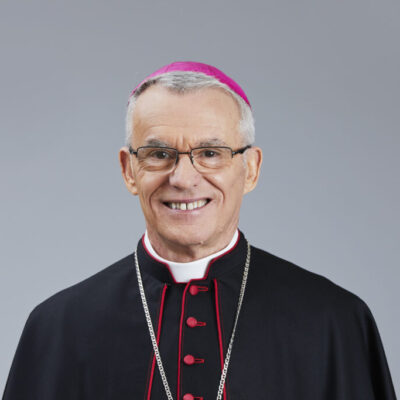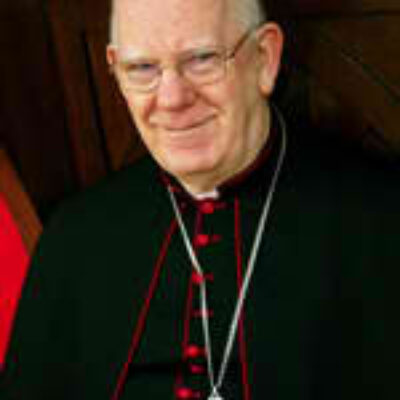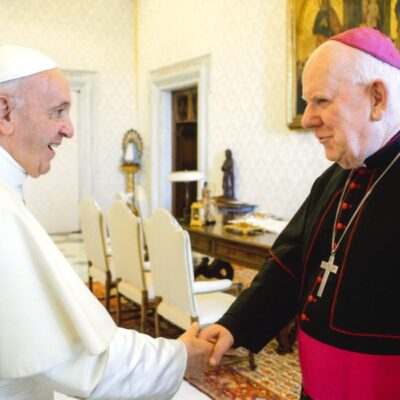Diocesan Synod Report
Diocesan Summary 2024
Synod of Bishops 2021 – 2024
Roman Catholic Diocese of Bunbury
Western Australia, Australia
About the Roman Catholic Diocese of Bunbury
We are the Roman Catholic Diocese of Bunbury from Western Australia. We are a geographically large rural diocese with a scattered population across 26 parishes. Our Diocese includes costal, metropolitan, mining and farming towns. We are also experiencing an expanding services industry. Some of our larger towns are experiencing significant population growth while other small farming towns face dwindling populations and closure. Tourism is a large industry in our Diocese and many towns are popular destinations for both local and foreign tourists. Our communities are populated by both ageing people and young families. In some areas much migration has occurred while others see generations of families still present. Many of our young people leave our Diocese in pursuit of further opportunities in education, work, social and family life.
Currently the Diocese is experiencing “sede vacante” with Bishop Emeritus Gerard J Holohan retiring in 2023 after serving 22 years as the Roman Catholic Bishop of Bunbury. The Most Reverend Timothy J Costelloe, Archbishop of Perth, has been appointed as our Apostolic Administrator. This period of waiting and transition has presented both opportunities and challenges and allows us a unique perspective on the Synod of Bishops 2021 – 2024 and on synodality.
The Process
The task of coordinating our Diocesan consultation and creating the Diocesan Report was given to the Diocesan Office for Evangelisation. We have undertaken two approaches for this consultation. The first was to announce to our parishes and clergy the current Diocesan Consultation Phase. While we did not ask every parishioner to be involved in the consultation, we did communicate that should groups wish to undertake a reflection session and submit their findings, they were welcomed to do so. We also offered assistance to any parish or group that wished to undertake and submit their reflections. Several parishes and groups made use of this offer and submitted their reflections to us. We also identified several key groups to be targeted for this consultation; priests and deacons, parish pastoral council representatives and key leaders in the diocese, both lay and religious, from a number of different ministries and groups. The targeted consultations were conducted through Zoom over several weeks.
There were some challenges in conducting these consultations. Given our Diocesan Synod in 2019, followed by the Plenary Council of Australia 2020 – 2022, many felt a “consultation fatigue.” This led to a lack of leadership, enthusiasm and lack of promotion of the Synod of Bishops 2021 – 2024. The result was that many of our people (aside from some who were keeping abreast of developments by their own volition) felt ill equipped, overwhelmed and left out of the process. Many felt that the language, depth and magnitude of the Synthesis Report was an obstacle to their engagement, especially if they had no familiarity with the topics or the process so far. This also led to some parishes, parishioners and leaders not engaging with the consultation. Given the vast distances between our parishes and people and the tight timeframe for the Diocesan Consultation phase, physical meetings were not a possibility for us, but many felt that the ‘Conversations in the Spirit’ would be greatly enhanced in a face to face environment.
In total we received 15 consultation reports from different groups. Each group was 4 – 6 members in size. These were received from:
- Five groups consisting of priests (both active and retired.) These groups were facilitated by the Office for Evangelisation via Zoom with one group meeting independently.
- Three groups of Parish Pastoral Council representatives from eight different parishes. These groups were facilitated by the Office for Evangelisation via Zoom with one group meeting independently.
- One group of Diocesan Leaders. These groups were facilitated by the Office for Evangelisation via Zoom with one group meeting independently.
- Four groups from several parishes.
- Two from other groups in the diocese.
Groups were invited to conduct reflection sessions as outlined by the Australian Catholic Bishops’ Conference National Center for Pastoral Research. Some groups focused on particular chapters with chapters 8, 9, 10, 11 and 16 being most common. Others chose to focus on the one question and two sub questions asked using the chapters of the Synthesis Report as the basis for their reflection.
It is from this context we now offer our insights and reflections on the Synthesis Report and in answer to the questions posed to us. We have summarized the results into themes for this document.
Introduction
We have gathered, prayed and journeyed together through this Diocesan Consultation Phase of the Synod. For some this is a new experience, while others have long awaited the opportunity to be more synodal. Much of the journey of the Synod has already occurred resulting in many fruits and treasures. We enter into this journey affirming the good work the Synod has already done, while acknowledging that we as a Diocese have not been able to enter into this journey for a range of reasons and ongoing challenges. We recognise that this is part of our story also. While our population is small and our geographical area large, we continue our journey of faith in our part of the world, and as part of the one Body of Christ.
We are all part of the Body of Christ, each needed, necessary and unique, but what does being part of this Body of Christ mean? Our consultation sessions point to a body desperately and urgently needing to know and understand itself better in order to breathe, move and live. How can the different parts of the Body of Christ communicate, function and work together? How do the many parts come together to form a whole? These questions developed from our prayer and reflection.
A body must work together and strengthen itself. This is also part of the body reaching a greater understanding of itself. It has been both surprising and unsurprising to identify, that of the many groups that were consulted, there was much convergence on how to work together and strengthen the Body of Christ into the future. It is also worthwhile investigating, that with many agreeing on the way forward, why are there barriers that continue to exist and what precisely are these barriers?
Our physical bodies reveal to us something about the Body of Christ. Our physical bodies are complex and beautiful, revealing the glory of our Creator. Our physical bodies have many parts, all unique, all working together to make up the whole. There is constant, unique and targeted communication throughout bodies, allowing each part to function and contribute to the whole. There are parts that are different, that occasionally get injured, and all of the parts rely on each other to continue to live and be part of the whole. Our reflections and the current Synod both reveal and demonstrates how we, as the Body of Christ, should walk together.
Urgent Need
These two words pervaded almost every consultation session, report and ‘Conversation in the Spirit’. Our people, lay, religious, clergy, young and old, have been faithfully living out their lives as part of the Body of Christ. This has presented unique challenges – some have been overcome and others are still being wrestled with. Much of what has been outlined already by the Synod, and other areas discussed by groups, was seen as urgently needed. Some felt the Church is at crisis point and many proposals and convergences need implementation now. Underpinning this was a sense of fading resiliency and patience for some, sadness for others, while others expressed regret over those who have chosen to no longer journey with us. Many expressed frustration at waiting and talking without any concrete action. Questions arose about what could be actioned on local, grassroots level and why obstacles still exist at this level. Despite this hope and faithfulness remain grounded in Christ and in this synodal journey. A great willingness, openness and desire for the fruits of this Synod was expressed. Enhancing differentiated co-responsibility for mission is possible but requires urgent action. The Body of Christ needs to move in this way and allow its different parts to function as intended.
Formation and Mission
Formation, education, training and related terms were mentioned 45 times throughout the submissions received. An urgent need for formation for every part and the entirety of the Body of Christ was recognized. Formation for everyone, at every level and across all levels in every area. Formation should not be isolated – it should move and flow freely between each part of the body – connecting us to each other and strengthening our bonds. In some sense formation is the blood of the Body of Christ, giving life and energy to every part and connecting every part together. Formation of the laity, priests, bishops, deacons, seminarians and other ministers were all identified as important areas where co-responsibility and collaboration could be practiced. Formation in synodality was also identified as a key area. A concrete thirst for formation was discovered, especially in regards to understanding the Church itself – or put another way – the body seeking to understand itself, its parts, and how they can function as one. ‘Conversations in the Spirit’ unveiled that a lack of formation is an obstacle to synodality and mission. Many felt that they did not posses the knowledge, understanding or authority to engage with the Synthesis Report. This reflects a wider hesitancy and paralysis when it comes to mission and synodality present in some of the faithful. This could explain why many people chose not to engage in the consultation. This hesitancy to engage and a lack of empowerment of the people may be attributed to the consequences and effects of clericalism over many decades. Despite this it was recognized that there are some good formation and missionary opportunities that exist and need to be built on and supported.
Women
Women are already an integral part of the Body of Christ. Appreciation for women and the work they do in families, schools and communities was felt to be undervalued. The rediscovering of the value and worth of women is apparent. Some felt further movement in this area was needed. There has been much said on women and their role in the Body of Christ. Much more was said during the consultations and there is still more to say. In many ways the consultation revealed a sense of inevitability and expectation of women being key parts of the body in the future – particularly in all levels of leadership and mission. This was especially true of roles that have historically not been available to them – ministries of acolyte, deacon and, for some, priesthood. Some expressed the need for better formation opportunities for women and on the deaconate in general.
Communication and Listening
Communication and listening recurred throughout the consultation. Communication should be clear, frequent, varied, unique and effective. All levels of the Church should communicate to each other to ensure mutual understanding. This should also be underpinned in the practice of genuine listening and in a spirit of openness. Many pointed to the ‘Conversations in the Spirit’ as a worthwhile and effective practice for better communication and listening. A physical body is in constant communication with itself and its parts. Furthermore, this communication is differentiated according to need, circumstance and which parts of the body are communicating with each other. Likewise, the Body of Christ needs to learn to communicate with the different parts in different ways, according to context, to ensure effective and meaningful communication. The Synod used the idea of “widening the tent” during the continental phase of the Synod. Communication, listening and openness ensures that we are ready to widen the tent when the time comes. For the Body of Christ to fulfil its mission and ensure responsibility, constant, open and transparent communication is necessary. In a physical body, the head receives and sends the vast majority of communications. Likewise the Body of Christ should communicate and listen to Jesus Christ, the head of the Body of Christ, first, foremost and above all else. It is through good communication that strong, trusting and loving relationships can be built.
Relationships
The building of relationships with and between people was seen as essential. It is from the building and existence of collaborative, trusting and strong relationships that mission and synodality is realized. Relationships both with and between laity, religious, clergy and the episcopate was identified as needing improvement. A good community is made of many smaller relationships between its members. Likewise, the Body of Christ needs to build strong and trusting relationships with and between its different parts. We should also seek to create harmony where different groups have faced division. Co-responsibility is made possible through strong relationships with and between people. Relationships in small groups were specifically mentioned. Small groups allow for better engagement, collaboration, discernment and accompaniment than in larger groups. This focus on relationships should also lead us to engage with those on the peripheries and margins of society and of our Church. The strength of body is demonstrated by its relationships with its most vulnerable parts – those seeking justice, those feeling isolated, abandoned and alone. These parts of the body might be identified as the extremities of the body, in need of great warmth and connection with the other parts.
Peripheries and Outward Looking
There was a substantial expression of the need to be outward looking and listening to those who are excluded and on the outside. This listening and outward orientation needs to be grounded in Christ and the love He has and shares for and with all people. People identified included those who do not share our faith, those of other religions or no religion, those who have left the Church (including former clergy members), young people, families, cultural groups and LGBTQI people. There are also people who are part of the Body of Christ that feel outside or disconnected from the whole and/or from other parts. The Body of Christ needs to reengage its distant and suffering parts and reach out to others who are not part of the body. Simultaneously we need to ensure that we are open to including those who wish to be part of the Body of Christ and removing obstacles to inclusion where possible. Inclusion and representation should also be considered when we discern and select those who lead the Body of Christ.
Governance and Co-responsibility
Governance, co-responsibility and decision-making structures and processes were key areas of consultation. There was very little disagreement in these areas across all groups including clergy. There was universal agreement on the need for recognition and inclusion of all the people of God (including laity and women), according to their gifts, talents, charisms, experiences and potential, in all Governance, co-responsibility and decision-making structures and processes. There appears much to be gained from developing a sense of differentiated co-responsibility, governance and decision making in the Church. Our mission suffers when this is absent. Formation was identified as a key aspect of enhancing what is already occurring. Many felt that discernment and the practice of ‘Conversations in the Spirit’ should also be integrated. Particular bodies, processes and structures that were mentioned included Parish Pastoral Councils, and Diocesan Pastoral Councils, as well as other movements and associations. Good governance, leadership, decision-making and responsibility structures and processes rely on the other areas already mentioned in this document to be accepted and effective. It is important that the Body of Christ trusts itself and its parts in order to function. This should be considered when selecting those for leadership and governance positions. The principles of Catholic Social Teaching and especially subsidiarity are essential for good governance and co-responsibility and are likely to be applied where trust is strong. As the Body of Christ understands itself better and strengthens itself, its leadership and governance will also improve. Ensuring the gifts and charism of all parts of body are recognized and nurtured will also improve governance and responsibility.
Gifts, Charism, and Laity
The Holy Spirit is active in both the whole and in each part of the Body of Christ. It nurtures different gifts and charisms in clergy, religious, laity and episcopate. These gifts and charisms need to be recognized, nurtured and utilized in every person in service to the mission of the Church. The consultation revealed a shared responsibility of everyone to achieve this – we all need to be aware and nurturing of the gifts of others. This was seen as fundamental in continuing to fulfil our mission. Importantly many of our clergy voiced strong opinion on recognizing and celebrating the gifts and charisms of all and especially women and their role in the Church. Each person in the Church should be given the opportunity to contribute to the mission and life of the Church according to their gifts and abilities. Furthermore we must ensure people’s gifts can grow. When parts of the body are strengthened and able to contribute, the whole body benefits. This is true also of the Body of Christ. There was discussion about expanded roles that the laity could fulfill especially in regards to pastoral work, teaching, sacraments, family life, preaching, evangelisation and other areas. Building on the gifts and charisms of all is essential to mission and true co-responsibility. Conversely, where gifts and charisms have been stifled or neglected, co-responsibility and mission have been stifled. These discussions also led to a conversation about clericalism.
Clericalism
The Synthesis Report defines clericalism well and accurately suggests that both clergy and the laity can suffer from clericalism. As mentioned we see the effects of clericalism still with people lacking formation and empowerment. Some feel too fearful to move or contribute due to clericalism. Others have never been given the opportunity to contribute meaningfully to the life of the Church and now doubt themselves. Clericalism breaks trusts and relationships. Concern was expressed at “clericalising” the laity. Others voiced that roles and responsibilities held by laity are often not respected by some at the same level of clergy. St Paul describes how the eye cannot say to the hand “I do not need you.” Clericalism is one part of the body devaluing another. In many ways clericalism and its affects has been embedded into our Church. It was felt that formation at a grassroots level and acceptance at all levels of the Church could combat this. The lonely, isolated and sheltered lifestyle of priests was also raised as a concern. Many felt the need to offer support to and integrate our priests better in our communities. Furthermore priestly formation in seminaries would benefit from input and leadership from the laity.
Other Points
There were some other discussions worth noting during the consultation.
The involvement of the whole Body of Christ, including laypeople and women, was seen as necessary in the future selection of seminarians, priests and bishops. Furthermore the whole body should be involved in the formation and ongoing formation of all of its members and especially seminarians, priests, and bishops. The above is also true of our lay and religious leaders.
The family unit or domestic Church is still an important place of evangelisation. Some lamented the lack of support and pastoral planning for families, couples discerning marriage and young people. Others suggested that structures already in place need support and renewal such as Worldwide Marriage Encounter Australia and others. New media and relevant and effective strategies to evangelise every person at every age is needed.
Increasingly our communities are becoming multicultural. This presents its own set of challenges that can only be overcome by awareness, openness, listening and by the creation of opportunities to come together. The issues of language and cultural barriers and therefore the involvement of migrants in the life of the Church (including the Synod), was mentioned as an obstacle. Many migrants bring with them a rich and deep faith. This could benefit their new communities if effective formation of everyone enabled mutual understanding.
Acknowledgement and Recognition
Through the consultations there became an apparent need for recognition and acknowledgement of a number of phenomena. It is only by truly recognizing and acknowledging our challenges, histories, issues as well as strengths, can we truly begin to journey together.
- The Holy Spirit. The presence of the Holy Spirit, moving and living in every person , must be recognized and acknowledged. From this all our missionary action flows.
- There are many that have been hurt and continue to be hurt by the decisions, actions and leadership of some in our Church. In some cases these wounds have healed, in others they remain open and in others scars have formed. For some these wounds have caused them to leave the Church. Others have remained, wounded but also faithful and willing. Like Christ, in our woundedness, we carry out our mission. Identifying that many are hurting in our Church may provide healing and encouragement.
- This has already been mentioned elsewhere in this document and the Synthesis Report. It is important to continue to identify, recognise and rectify the effects of clericalism in our Church.
- The contribution and treatment of women. Women have been contributing faithfully and fruitfully to the life of the Church since its very beginning. It was expressed that the Church should acknowledge the restrictions and injustice that women have experienced and continue to experience in some places.
Differentiation
Our identity as a diocese is firmly rooted in our ties to the land. The traditional custodians of the land worked with it and lived off it. We need to continue this as stewards of creation while building relationships with local indigenous people. Our communities span vast areas, with each region and area having its own unique character. This same land that nourishes us can also isolate us. Living and working this land we realise that what works for one part of the land may not work for the other. What works for one community may not work for another. Likewise for the Body of Christ, what works for one part may not work for the other. It is important to recognise that one approach, program or structure will not be able to meet all the unique needs of the Church in its rich complexity, uniqueness and expressions. Being attuned and accommodating to unique local needs is important. We must be aware and be willing to action differentiated approaches, processes and structures to ensure we reach every part of the Body of Christ.
Main Points
- There is an urgent need for many of the Synod recommendations to be promulgated and implemented. Some of these recommendations can already commence at a local level.
- Formation across all areas and levels in the Church is necessary. A historic lack of formation may be a factor in the reluctant and inability of many to engage in mission and synodality.
- Women in the Church should be included and celebrated at all levels of leaderships and decision-making. Ordaining women to the Deaconate needs to be continually explored with many feeling this is an inevitability.
- Governance, leadership, differentiated co-responsibility and decision-making structures and processes need to include the whole Body of Christ and applied Catholic Social Teaching principles including subsidiarity. The people selected for these roles need to be trustworthy and ready to build strong relationships with and between people.
- With Christ as our center, we need to continue to look outward and towards those on the outside.
- We are still dealing with the effects of clericalism in both clergy and laity. Recognition of the gifts and charisms of all and the acknowledgement of wounds caused by clericalism will help us move forward.
- Each part of the Body of Christ is unique. It is important that we respond uniquely to unique needs – what works for some may not work for others or for all.
Conclusion
The Body of Christ is undergoing a period of growth and change. This is not unlike the adolescent development phase of our physical bodies. These changes can be painful, long and confusing but also worthwhile and fruitful. Most importantly these changes are necessary for our continuation into the future. The Synod of Bishops 2021 – 2024 has already discerned many good and worthwhile areas. As we seek to further understand ourselves we offer the above insights. Recognising Christ as the head of the Body of Christ and therefore our head, we await in prayer and faithfulness, the day when differentiated responsibility for mission becomes a reality and a new way of being the Body of Christ.
Authorship
This report was drafted by Mr. Aaron Faure, Evangelisation Coordinator of the Roman Catholic Diocese of Bunbury. It was drafted in consultation with Dr. Deborah Robertson and Dr. Stephen Hinton. Both of whom are part of the lay faithful and involved in Diocesan activities.







